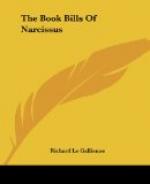Yet I should hardly, perhaps, have evoked this particular corollary from that man of leather’s observation, if I had not chanced one evening to come across those old book-bills of my friend Narcissus, about which I have undertaken to write here, and been struck—well-nigh awe-struck—by the wonderful manner in which there lay revealed in them the story of the years over which they ran. To a stranger, I am sure, they would be full of meaning; but to me, who lived so near him through so much of the time, how truly pregnant does each briefest entry seem.
To Messrs. Oldbuck and Sons they, alas! often came to be but so many accounts rendered; to you, being a philosopher, they would, as I have said, mean more; but to me they mean all that great sunrise, the youth of Narcissus.
Many modern poets, still young enough, are fond of telling us where their youth lies buried. That of Narcissus—would ye know—rests among these old accounts. Lo! I would perform an incantation. I throw these old leaves into the elixir vitae of sweet memory, as Dr. Heidegger that old rose into his wonderful crystal water. Have I power to make Narcissus’ rose to bloom again, so that you may know something of the beauty it wore for us? I wonder. I would I had. I must try.
CHAPTER II
STILL INTRODUCTORY, BUT THIS TIME OF A GREATER THAN THE WRITER
On the left-hand side of Tithefields, just as one turns out of Prince Street, in a certain well-known Lancashire town, is the unobtrusive bookshop of Mr. Samuel Dale. It must, however, be a very superficial glance which does not discover in it something characteristic, distinguishing it from other ‘second-hand’ shops of the same size and style.
There are, alas! treatises on farriery in the window; geographies, chemistries, and French grammars, on the trestles outside; for Samuel, albeit so great a philosopher as indeed to have founded quite a school, must nevertheless live. Those two cigars and that ‘noggin’ of whiskey, which he purchases with such a fine solemnity as he and I go home together for occasional symposia in his bachelor lodging—those, I say, come not without sale of such treatises, such geographies, chemistries, and French grammars.
But I am digressing. There is a distinguishing air, I but meant to say, about the little shop. Looking closer, one generally finds that it comes of a choice bit of old binding, or the quaint title-page of some tuneful Elizabethan. It was an old Crashaw that first drew me inside; and, though for some reason I did not buy it then, I bought it a year after, because to it I owed the friendship of Samuel Dale.
And thus for three bright years that little shop came to be, for a daily hour or so, a blessed palm-tree away from the burden and heat of the noon, a holy place whither the money-changers and such as sold doves might never come, let their clamour in the outer courts ring never so loud. There in Samuel’s talk did two weary-hearted bond-servants of Egypt draw a breath of the Infinite into their lives of the desk; there could they sit awhile by the eternal springs, and feel the beating of the central heart.




